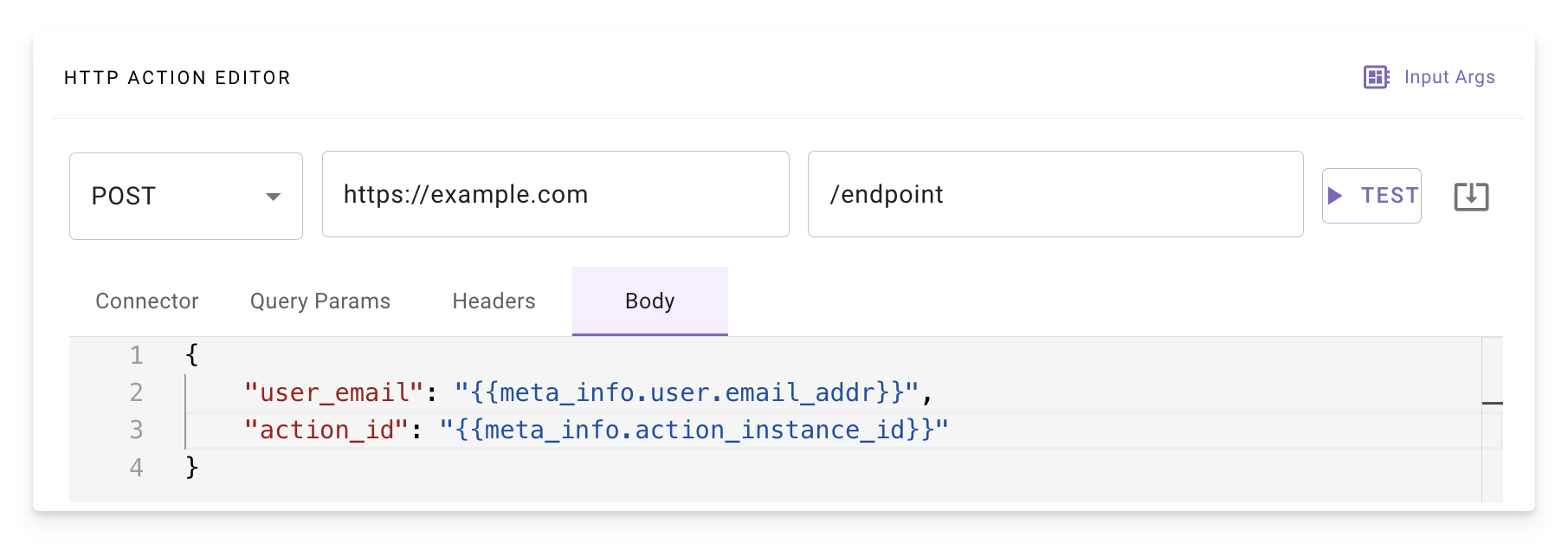Data Bank
Overview
The Data Bank in Agent Studio is a centralized repository that stores and provides access to data generated or collected during a plugin’s execution. It enables subsequent steps in a workflow to reference data from previous steps, such as user inputs (slots), action outputs, or metadata. The Data Bank ensures seamless data flow across plugins, actions, and conversation processes, making it a core concept for building dynamic, context-aware workflows.
Important: While the Data Bank shares a common structure (
meta_infoanddatakeys), availability of specific keys and sub-keys varies by context (Compound Actions, HTTP Actions, Conversation Processes, or Slot Validation Policies). Always check the context-specific details below to avoid reference errors.
Key Use Cases
- Reusing User Input: Reference a user-provided slot (e.g.,
ticket_id) in multiple actions. - Chaining Actions: Pass the output of one action (e.g., a device ID) as input to another.
- Accessing Metadata: Use user attributes (e.g.,
meta_info.user.email_addr) for personalized workflows.
Data Bank Structure
The Data Bank contains two primary keys: meta_info and data These keys store metadata and workflow-specific data, respectively. Below, each key is detailed with its availability across contexts.
meta_info
meta_infoProvides built-in metadata about the current execution context, such as user attributes or unique identifiers.
Availability
- Compound Actions: N/A.
- HTTP Actions:
meta_info.user,meta_info.action_instance_id. - Conversation Processes:
meta_info.user. - Slot Validation Policies:
meta_info.user
meta_info.user
meta_info.userContains attributes of the user who triggered the plugin. Use the notation meta_info.user.<attribute> to access specific attributes. For a full list, see the User Attributes Reference.
meta_info.action_instance_id
meta_info.action_instance_idA unique UUID provided during execution, usable as an idempotency key to deduplicate retry calls.
Example (HTTP Actions Only):

Referencing meta_info.user.email_addr and meta_info.action_instance_id in an HTTP Action
data
dataStores workflow-specific data, including slot values and action outputs. Use the notation data.<key>.
Availability
- Compound Actions:
data.input_argument,data.output_key. - HTTP Actions: N/A.
- Conversation Processes:
data.slot_name,data.output_key. - Slot Validation Policies: N/A.
data.slot_name
References user-provided slot values defined in a conversation process. Use this to access input variables collected from the user or inferred by the Assistant.
data.input_arg
References system-provided input arguments defined in a compound action.
data.output_key
References the output of actions (e.g., Built-in, HTTP) or expressions (e.g., for, raise, action). Each action or expression saves its output to a specified output_key, which can be used in subsequent steps.
Do not reuse key names for slots and output keys as this can cause confusion for the reasoning engine and lead to unexpected behavior. Each key created in the data bank should be unique.
Example: Action Output (Compound Actions):
steps:
- action:
action_name: get_user_device
output_key: device
input_args:
user_email: meta_info.user.email_addr
- action:
action_name: clean_recycle_bin_on_device
output_key: remote_action_result
input_args:
device_id: data.device.asset_uuid # References output from first actionresponse
responseUsed specifically in an action’s Output Mapper to reference the raw response from the action. Use DSL syntax to extract specific fields.
Availability
- Conversation Process Only (in Output Mappers).
Example

Configuring an Output Mapper with response
value
valueUsed exclusively in Slot Validation Policy to reference the current slot’s value during validation. Combine with DSL expressions to enforce rules.
Example:
For a due_date slot, ensure the date is in the future:
$PARSE_TIME(value) > $TIME()
Accessing the Data Bank by Context
The following table summarizes key availability. Reference errors occur if you attempt to use a key outside its supported context.
| Context | Available Keys |
|---|---|
| Compound Actions | data.input_arg, data.output_key |
| HTTP Actions | meta_info.user, meta_info.action_instance_id |
| Conversation Processes | meta_info.user, data.slot_name, data.output_key, response (in Output Mappers) |
| Slot Validation Policies | value, meta_info.user |
Updated 17 days ago